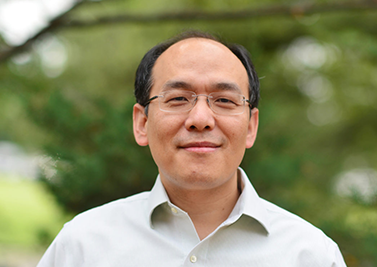 |

|
 |
Professor Qingbin Cui, director, Build America Center. |
|
Chatbots have been around for years, but advances in AI are making them able to do more and better things for their human users. A new bot developed by UMD Professor Qingbin Cui’s team at the Build America Center (BAC) can help stakeholders obtain customized information about the Bipartisan Infrastructure Law and its implementation.
The 2021 law, formally known as the Infrastructure Investment and Jobs Act, earmarked $1.2 trillion in funds for transit and transportation, road infrastructure, and initiatives to promote clean water, electric grid renewal, and access to broadband. Stakeholders, including local, state, and federal officials, want to be able to track how the funds are being used, what projects are being funded, and what kinds of outcomes are being achieved.

Development of the tool was led by Ya “Eric” Ji, an seasoned software development expert who has pioneered other innovative apps, including incenTrip, which incentivizes users to make more extensive use of multimodal transportation to reduce congestion, emission and energy consumption.
But nailing down the precise information a particular user wants can be tricky using conventional dashboards or information sources. Explains Cui: “Say a user wants to know how Maryland stacks up against neighboring states in terms of its BIL funding. It can be hard to pull that kind of information from a traditional dashboard. Such tools use a fixed set of parameters and don’t offer users much flexibility."
That’s where the BAC’s chatbot, dubbed BIL Launchbot, comes in. Trained on data gathered by the center, and utilizing the OpenAI platform, it can respond to just about any question that a user may put to it–and deliver the answers instantaneously. Not only that, but it can provide the information in a range of formats, including tables and charts.
Development of the tool was led by Ya “Eric” Ji, an seasoned software development expert who has pioneered other innovative apps, including incenTrip, which incentivizes users to make more extensive use of multimodal transportation to reduce congestion, emission and energy consumption.
While the team doesn’t track individual queries, Cui says the most common users will likely include grant applicants, state officials interested in assessing performance, and federal program administrators who likewise want to know how specific programs are doing.
And the current version of the app is only the beginning; Cui and his team are already planning upgrades that will include embedding in BilLaunchPad.com, a website built by the BAC to provide comprehensive information and data about the landmark legislation—considered the largest investment in transportation infrastructure in U.S,. history.
“We want everyone to be able to get answers to their questions readily, and to understand how the BIL can help them and their communities,” Cui said.
Founded in 2022 and led by Cui, the BAC provides technical assistance and expertise related to the BIL. Four other universities—Virginia Tech, Georgia Tech, Purdue, and Stanford—are regional leads for the center, which is funded by the U.S. Department of Transportation. For more information, visit bac.umd.edu.
December 17, 2024
|

